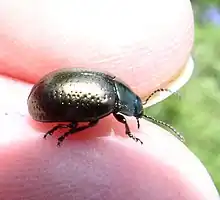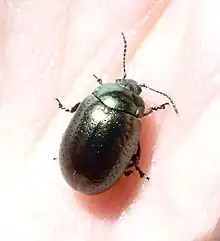Chrysolina hyperici
Chrysolina hyperici, the Saint John's wort beetle is a species of beetles of the family Chrysomelidae.[1]
| Chrysolina hyperici | |
|---|---|
 | |
| Scientific classification | |
| Domain: | Eukaryota |
| Kingdom: | Animalia |
| Phylum: | Arthropoda |
| Class: | Insecta |
| Order: | Coleoptera |
| Infraorder: | Cucujiformia |
| Family: | Chrysomelidae |
| Genus: | Chrysolina |
| Subgenus: | Hypericia |
| Species: | C. hyperici |
| Binomial name | |
| Chrysolina hyperici (Forster, 1771) | |
| Synonyms | |
| |
Life cycle

The species lays up to 2.000 eggs on the host plant during the early fall.[1] They lay their eggs on the undersides of leaves of new fall basal growth on its host plant, St. John's Wort (Hypericum perforatum).[2] The larvae feed for a month on the leaves, emerging at night and hiding during the day. When full grown they move to the soil to pupate. After two weeks they emerge as adults. In the spring the adults feed upon new growth of their host plant.
Taxonomy
The species is most often classified as Chrysolina hyperici (Forster, 1771), however it was originally placed in the genus Chrysomela as Chrysomela hyperici. It was first scientifically described and named by Johann Reinhold Forster in Novæ species insectorum in the year 1771.[3] Within the genus Chrysolina, the species is classified in the subgenus Hypericia.[4] It is closely related to the species Chrysolina quadrigemina.[5]
Distribution
Originally distributed in Europa and Asia, it has been introduced in other places as biological control of Hypericum perforatum.[6][7][8][9]
References
- Bugguide.net. Species Chrysolina hyperici - St. Johnswort Beetle
- Hook, Patrick (2008). A Concise Guide to Insects. Bath : Parragon. p. 211. ISBN 978-1-4075-1132-0. Retrieved 28 July 2023.
- "Chrysolina hyperici (Forster, 1771) in GBIF Secretariat". GBIF Backbone Taxonomy. Global Biodiversity Information Facility. 2022. Retrieved 25 July 2023.
- "Chrysolina (Hypericia) hyperici (Forster, 1771)". Fauna Europaea. Retrieved 28 July 2023.
- "Chrysolina quadrigemina". biocontrol.entomology.cornell.edu. Cornell College of Agriculture and Life Sciences. Retrieved 28 July 2023.
- Huffaker, C. B. and C. E. Kennett (1959). A ten-year study of vegetation change associated with biological control of Klamath weed. Journal of Range Management 12: 69-82.
- Peter Jay Morin. Community Ecology. Oxford: Blackwell, 1999. ISBN 0-86542-350-4. P. 106-107.
- Gilbert Waldbauer. What Good are Bugs?: Insects in the Web of Life. Cambridge: Harvard University Press, 2003. ISBN 0-674-01027-2. P. 158.
- Richard E. White. A Field Guide to the Beetles of North America. Boston: Houghton Mifflin, 1983. ISBN 0-395-91089-7. P. 296.